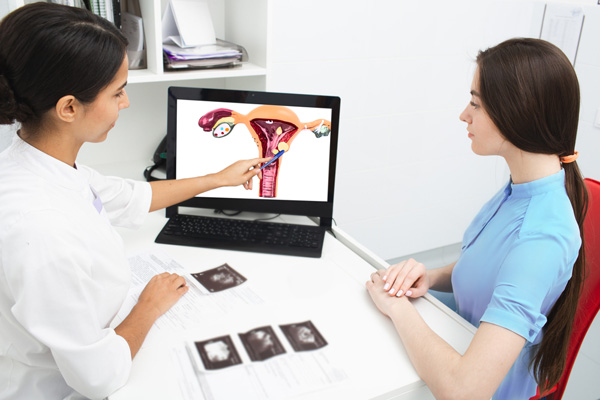What Are Fibroids and What Causes Them?

Most uterine fibroids are noncancerous, and many patients do not realize they have them. This often leaves patients confused about what could have caused their fibroids, while they also wonder what exactly fibroids are. An OB/GYN can provide clarification on a patient’s unique condition. However, in the meantime, an overview may help.
Fibroids: What are they?
Fibroids are muscular tumors that develop in or around the uterus. They are benign, meaning they are rarely related to cancer. Per the Office on Women's Health, an OB/GYN will diagnose a fibroid depending on where exactly it grows in relation to the uterus as follows:
- Intramural. Develops in the uterine walls.
- Submucosal. Grows into the uterine cavity rather than on the walls.
- Subserosal. Develops on the outside of the uterus.
- Pedunculated. Forms in stalks that are rooted in the uterine surface or within the uterine cavity.
Diagnosis
An OB/GYN may diagnose fibroids during pelvic examinations. However, other tests are available if a patient has noticed the symptoms in between exams. A healthcare provider may recommend ultrasounds to find, map, and measure fibroids. Additional tests, like an MRI (magnetic resonance imaging), may be needed if the ultrasound results are inconclusive. If the primary symptom is bleeding between periods, a lab test may be necessary to rule out other potential causes, such as anemia.
Symptoms to look out for
Uterine fibroids do not always cause symptoms. But when they do, the most common are:
- Constipation
- Difficulty urinating
- Frequent urination
- Stomach pain
- Lower back pain
- Pelvic pain
- Pain during sex
- Weight gain in the lower abdomen
- Spotting between periods
- Longer, heavier, and more painful periods
According to the Office on Women's Health, in rare cases, fibroids are linked to trouble conceiving. They may also cause pregnancy complications.
Causes of fibroids
There is no clear known cause of fibroids. There are, as the Mayo Clinic states, several factors that may contribute to their development. These include:
Gene changes and genetics
Although fibroids are muscular growths and the uterus has muscular tissue, the genes found in these types of cells are different. Further, fibroids can run in families. Patients with a family history of fibroids are at a higher risk for developing them.
Hormone levels
Hormone levels, particularly estrogen and progesterone, can contribute to the formation of uterine fibroids. The higher the estrogen and progesterone levels, the more a fibroid grows. This is why these growths are common during a patient's most fertile years or when they are pregnant. Fortunately, anti-hormone medication can effectively shrink fibroids.
The extracellular matrix (ECM)
This is what groups cells together. With fibroids, there is an increased amount of ECM between cells. As a result, the growth becomes fibrous.
Treating fibroids
While asymptomatic fibroids may need regular monitoring, they may need more treatment action if they develop other symptoms. Fortunately, there are several treatment options available. An OB/GYN may recommend medications to shrink the fibroid or minimize symptoms. Alternatively, the fibroids may need surgical removal.
Consult an OB/GYN
Fibroids are noncancerous muscular tumors that grow within, on, or around the uterus. They can be easily detected during a routine pelvic exam. That said, if a patient has symptoms, they should not wait to consult a medical professional. To schedule an appointment with an OB/GYN, contact our Tomball office today.
Request an appointment here: https://eckhardtobgyn.com or call Donald Eckhardt Jr., M.D. , Kari Eckhardt W.H.N.P., C.N.M. at (346) 201-4716 for an appointment in our Tomball office.
Check out what others are saying about our services on Yelp: Fibroids in Tomball, TX.
Recent Posts
A C-section, also known as a cesarean section, is a surgical procedure used to deliver the baby through incisions made in the abdomen and uterus. An OBGYN typically performs this procedure when a vaginal delivery is not possible or poses a risk to the mother or baby. Although many women are familiar with natural childbirth,…
A pregnancy doctor offers essential support when preparing for labor and delivery. Throughout the final trimester, patients benefit from expert monitoring, personalized birth planning, and guidance to ensure a safe delivery. By working closely with an experienced pregnancy doctor, families can approach the birth experience with greater confidence and clarity.As delivery approaches, a pregnancy doctor…
The first visit to a gynecologist is a proactive and engaging way to participate in your healthcare. This appointment focuses on your needs and goals regarding the healthcare surrounding your reproductive system. While feeling nervous is normal, knowing what to expect during the appointment can help calm your nerves.For many individuals, especially those attending their…
A pap smear, or pap test, is a common and important procedure used to screen for cervical cancer and detect abnormal cells in the cervix. Regular pap smears are a critical part of preventive healthcare for women, typically recommended starting at the age of 21. Understanding what happens during a pap smear can help alleviate…


